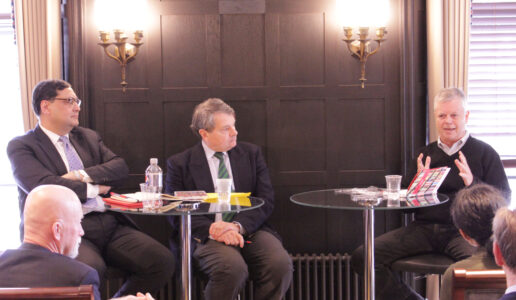BtH: Foreign Policy and the 2016 Elections
Experts discussed the foreign policy implications of the 2016 United States presidential election at a March 2, 2016 panel held at the Frederick S. Pardee School of Global Studies at Boston University. The event was part of the School’s “Beyond the Headlines @BUPardeeSchool,” or BtH series.
The panel, entitled “Foreign Policy in the 2016 Elections,” included Stephen Kinzer, Senior Fellow in International and Public Affairs at the Watson Institute of International and Public Affairs at Brown University and Ambassador Paul Hare, Senior Lecturer at the Pardee School. The discussion was moderated by Pardee School Dean Adil Najam.
Kinzer, an award-winning foreign correspondent formerly of the New York Times, said the range of opinions on foreign policy in the modern American presidential campaign is narrow, and that candidates often exaggerate the number and severity of threats to the United States.
“We definitely as a nation want to have a focus for our enmity, we need to know there’s someone out there who wishes us ill and we’re going to go out and get that guy,” Kinzer said. “The candidates do have a chance to vent on whichever enemy seems to be out there for the day.”
Hare, a British diplomat for 30 years and the British ambassador to Cuba from 2001-2004, brought a foreign perspective to the discussion, noting that the process of American presidential campaigns are strange to observers outside the United States, especially in secular European countries.
“The immediate soundbites played on BBC or Al Jazeera or wherever around the world don’t go into the complications of the process,” Hare said. “Similarly, references to the Constitution, references to religion in the narrative, are I think very strange to most overseas observers.”
Hare also said he believes Sen. Bernie Sanders has failed to challenge Hillary Clinton on several foreign policy missteps she made while serving as Secretary of State.
Kinzer echoed Hare’s point, arguing that foreign policy experience and knowledge does not always ensure that a candidate will make the best decision when in office.
“If you read those stories in the New York Times about Hillary’s involvement in the Libya debacle over the last couple of days you realize she knew a lot but she still came to the wrong decision,” Kinzer said.
